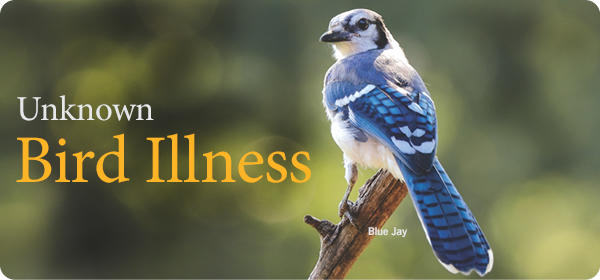
*MYSTERY BIRD ILLNESS UPDATE - 08/17/21*
Dear friends,
Thank you to everyone who has reached out for guidance on the unknown bird illness. We are happy to report that we have received an official update from Maryland DNR on this illness. You can read their update HERE.
So, for those who have been waiting for an official all clear to feed the birds, you now have it. If you could please share this great news to help us get the word out that it is safe to feed the birds again.
Now, let's get back to feeding the birds and enjoying nature, but of course be aware and keep those feeders and bird baths clean!
Sincerely,
Your WBU Easton Flock
__________________________________________________________________________________________________________________________________________________
Please report any birds exhibiting symptoms. If you live in Maryland report Unknown bird illness
The key to keeping birds safe is to ALWAYS be a responsible bird feeding hobbyist. Keep your bird feeders and bird baths clean! Please refer to our recommendations for Responsible Bird Feeding shown below.
The health and well-being of birds is our number one priority! We know that under normal circumstances, feeding the birds can have a tremendously positive effect on them when done responsibly. Feel free to stop by our store or call us with any questions. We appreciate your support as always! #savethesongbirds
Responsible Bird Feeding Techniques
If you enjoy feeding and watching your backyard birds, then you probably want to do as much as you can to practice your hobby safely and ensure the birds’ overall health and well-being. While the incidence of birds falling ill from feeders is small compared to other natural hazards birds face, there are things you can do to help your birds stay healthy.
- Provide multiple feeding stations in different areas of your yard to disperse bird activity.
- Provide seed from a bird feeder rather than scattering it on the ground.
- Keep areas clean under and around your feeders.
- Keep fresh seed in the feeder and be sure it doesn't get moldy.
- Clean your bird feeders regularly with a solution of one part bleach and nine parts water.
- The following strategies will help improve the health and safety of birds when the spread of avian diseases is a concern.
- If feeder birds are exhibiting disease symptoms, then remove all feeders so local birds can disperse and utilize natural food sources.
- Clean and sanitize all bird feeders, bird baths and hardware with a 10% bleach (one part bleach to nine parts water) solution. Rinse thoroughly and allow to completely dry before refilling feeders. Continue to sanitize feeders every few days.
- Rake up and discard seed debris and bird droppings from the ground below and around feeders. Continue to clean these areas on a regular basis.
- Give the birds more space. If using multiple feeders, place the feeders farther apart from one another. This will reduce crowding, lower stress and lessen the potential for disease transmission between sick and healthy birds.
- Only use feeders that can be easily cleaned. Replace wooden feeders with ones made of plastic or recycled materials for easier cleaning.
- Bird feeders with cracks and crevices are difficult to sanitize and should not be used.
- Remove open tray and platform feeders that allow fecal material and food to come into contact with each other.
- Use antimicrobial bird feeders such as Wild Birds Unlimited EcoClean® Feeders. These feeders have built-in antimicrobial product protection on the treated surfaces.
- Limit the amount of seed you provide. Offer only as much food as the birds will eat in one or two days.
- Store all bird seed in rodent- and insect-proof containers to avoid contamination.
- Always discard any seed that has become wet, moldy or foul smelling.
- Avoid handling sick birds and always wash your hands with soap and water after filling bird feeders.

